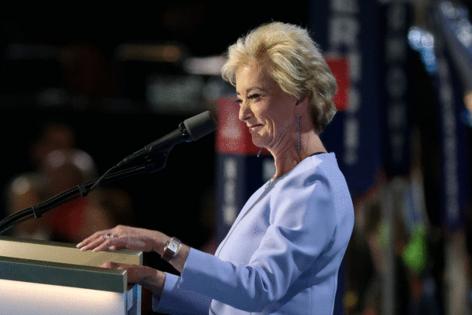Trump vowed to shut down Department of Education. Can he actually do that?
Published in Political News
On and off the campaign trail, President-elect Donald Trump has repeatedly vowed to abolish — or dramatically overhaul — the U.S. Department of Education.
“We will ultimately eliminate the federal Department of Education,” Trump said during a September rally, according to CNN.
In a 2023 campaign video, he said, “Rather than indoctrinating young people with inappropriate racial, sexual and political material … our schools must be totally refocused to prepare our children to succeed.”
Shortly after winning the 2024 election, he tasked his nominee for secretary of education, Linda McMahon, with disassembling the department.
“We will send Education BACK TO THE STATES, and Linda will spearhead that effort,” he wrote in a Nov. 19 post on Truth Social.
Will he be able to make good on his promises? Education policy experts weigh in.
Shutting down the Education Department
“My sense is that it is unlikely that the Department of Education will be shut down under the Trump administration,” Michael Cohen, a professor of Educational Leadership and Policy Studies at the University of Northern Colorado, told McClatchy News.
To disband the department, Congress would have to pass legislation authorizing its removal.
And gaining enough votes to do this — even in the Republican-controlled Senate and House — will be difficult, Cohen said.
“Closing the Department would be highly controversial and would trigger a filibuster in the Senate, and 60 votes would be needed to overcome the filibuster — in other words, the bill would ultimately require some Democrats to support it, which is highly unlikely,” Cohen said.
David Bloomfield, a professor of education at Brooklyn College and The CUNY Graduate Center, told McClatchy News, “After the last election and with Republican control of both houses, (the effort) could receive greater attention.”
But, while it’s possible a bill disbanding the department could pass in Congress, “it’s unlikely,” he said.
Trump also campaigned on shutting down the department in 2016. But, once in office, the Republican-controlled Congress didn’t go along with his proposal, Bloomfield said.
Effects of shutting down the department
If Congress does vote to shut down the Department of Education, many of its responsibilities — unless explicitly removed by law — would not suddenly disappear.
“Many of its functions would be transferred elsewhere,” Sandy Baum, a nonresident senior fellow at the Urban Institute, told McClatchy News.
For example, its federal student aid programs — one of its chief priorities — would likely be subsumed by the Treasury Department, Baum said.
Similarly, the department’s Office for Civil Rights would probably be transferred to the Department of Justice, and the Office of Indian Education would likely become the responsibility of the Department of the Interior, Bloomfield said.
“It sounds like he would be eliminating a huge bureaucracy, but in practice, assuming the continuation of a program, the bureaucratic responsibilities would be diffused, not eliminated,” Bloomfield said.
It’s also important to keep in mind that the department is only responsible for a fraction of total spending on education, Paul Peterson, the director of the Program on Education Policy and Governance at Harvard University, told McClatchy News.
In recent years, the department contributed “approximately 10% of all education spending,” Peterson said. “The other 90% comes from state and local governments.”
Other changes Trump could make
Short of scrapping the entire department, there are some more realistic changes that the incoming administration could make, experts said.
“There is plenty that Trump can do without reorganization to change federal education policy,” Sherman Dorn, a professor of education at Arizona State University, told McClatchy News.
For example, it’s likely the new Trump administration will decrease the federal government’s role in education research, Baum said.
“They will certainly change things like Title IX guidance and the approach to anything related to race,” Baum added. “And they may try to raise taxes on elite institutions.”
Other functions of the department would be harder to change, Peterson said.
“The most difficult programs to eliminate include the free and reduced lunch program, the special education program, the tuition loan program, and the compensatory education program,” Peterson said. “Each has strong bipartisan constituencies and/or current obligations that would be difficult to terminate.”
What exact changes are made within the department will largely hinge on McMahon, who led the Small Business Administration during Trump’s first term, Bloomfield said.
“I wouldn’t expect a revolution,” Baum said.
Part of a long-standing agenda
Since its creation by Congress in 1980, the Department of Education has frequently been targeted by Republican officeholders.
Former Arizona Sen. John McCain — who was the Republican nominee for president in 2008 — once voiced support for shutting down the department, according to CBS News.
Similarly, Utah Sen. Mitt Romney — the Republican nominee for president in 2012 — campaigned on dramatically reshaping the Department of Education.
He told donors he planned to combine it with another department “or make it ‘a heck of a lot smaller,’” according to NBC News.
But, unlike his predecessors, Trump has expressed competing viewpoints on education reform, Cohen said.
“On the one hand, there is a desire to decrease the federal role in public education — this would be the more traditionally conservative inclination, and closing the Department would be consistent with this,” Cohen said.
“On the other hand, President-Elect Trump has spoken (on the campaign trail) of withholding funding from schools that teach critical race theory or whose social studies curricula are insufficiently patriotic,” Cohen said. “This kind of proposal is quite the opposite of the traditionally conservative approach — it would turn the federal Department into the curriculum police.”
_____
©2024 The Charlotte Observer. Visit charlotteobserver.com. Distributed by Tribune Content Agency, LLC.




























































Comments